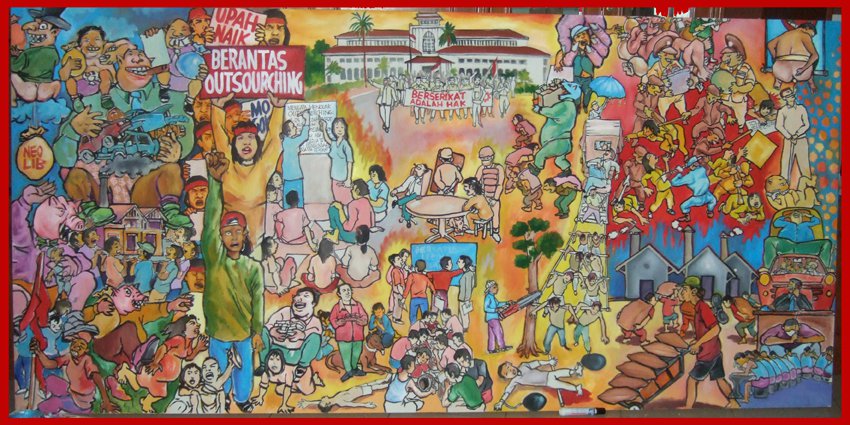Jakarta Post - September 24, 2011
Muhammad Ikhwan, Jakarta -- Indonesia will commemorate the 51st National Farmers' Day on Sept. 24. Over the years, we have witnessed the same demand from the farmers on the street: The right to land.
For many decades, farmers have lost in what I have called the fight for land. History tells that our farmers were brutally exploited in the cultuurstelsel era. Farmers were forced to plant export commodities like coffee and sugarcane. For those who owned land, 20 percent of it should be allocated for those aforementioned commodities. Those who did not, they had to work 75 days in a year for Dutch estates.
After independence, farmers still had to fight for land -- especially against big foreign companies. The fight sparked various movements aimed to reclaim land.
In 1960, a big boost came in the form of the enactment of Basic Agrarian Law, which supports redistributive land reform for farmers. In the New Order era, the fight for land did not stop but was kept at a minimum by military repression. Soeharto's regime implemented land redistribution via transmigration.
Jumping forward to recent years, the growing wave of privatization of land in Indonesia -- purchased by food and energy companies, multinationals or investment funds -- has seen the fight for land surface once again.
It is interesting that the same phenomenon keeps repeating and also involves the same actors: Companies versus people.
The dramatic new wave of land acquisition, or land grabbing -- a phrase coined by some academics and civil societies -- is in fact a worrying phenomenon. After subprime and financial crises, capital surge for land and food has been increasing.
This has resulted in sky-rocketing prices of food in recent years, with Food and Agriculture Organization (FAO) recording the highest food price index in February 2011.
The crises that ruptured in 2008 also gave rise to a new cycle of appropriation of land on a global scale. At least 50 million hectares of agricultural land have been transferred to corporations only in the last few years alone, and each day more investors are joining the rush.
In Indonesia, the land grab phenomenon is linked to big plantations. Related to this, we can see the comparison for land ownership in palm oil (2010). It shows an imbalance between private (49.76 percent), state (7.88 percent) and small-holder farmers (42.36 percent).
Data from the Central Statistics Agency (BPS) in 2010 shows that there are still 31.2 million poor people, with rural poor (19.93 million) and the urban poor (11.1 million).
The figure in rural areas is somehow congruent with the number of small-holder farmers, because they are the most vulnerable groups.
According to the BPS, small-holder farmers are people who own less than 0.5 hectares of land. The last agricultural census (2003) indicated a serious number of small-holder farmers (13.7 million people), with Indonesian Farmers Union (SPI) later in 2008 estimating a significant rise (up to 15.6 million).
Ignoring the figures, the government came up with the food and energy estate project in Merauke, Papua (MIFEE). This further land grab was aimed at acquiring 500,000 hectares of land. Upon enormous rejection, the project later became stagnate and had to be diverted to other provinces.
The rejection was initiated mainly by small-holder farmers and indigenous people. The land grab will disregard their rights -- and deny them access for land and resources for their livelihoods. Furthermore, the estate model does not guarantee the fulfillment of local food, as it will certainly look for the highest bidder.
The reasoning for small-holder farmers and indigenous people assenting with another came from High Level Panel of Experts of the Committee on World Food Security, saying that large scale investment in land is damaging food security, incomes, livelihoods and the environment for local people.
The estate model has also been challenged. The 2004 Plantation Law was brought to the Constitutional Court because some articles have the potential to criminalize farmers and indigenous people. Recently, the Constitutional Court annulled those articles.
In near future, we need to seek the best practices to implement some recommendations from the High Level Panel of Experts, particularly in securing the access and use of land for landless people, small-holder farmers, forest dwellers, fisher folk and indigenous peoples.
We also need to continue undertaking redistributive land policies in settings marked by inequality in land control and ownership -- in our case, this should be implemented according to 1945 Constitution and Basic
Agrarian Law.
Prioritizing investment in the small farm sector and in alternative food systems is crucial. As opposed to the estate model, we need a production model that is socially inclusive and as well as environmentally sustainable, using agro-ecological principles.
Finally, States and private sectors should not forget to recognize the right to free, prior and informed consent in relation to the land and natural resources on which people depend for their livelihoods.
We have a competitive cost of production, subsidies and especially hard-working farmers. Ensuring their victory in the fight for the right to land is one big step to improve the agriculture sector.
Happy Farmers' Day.
[The writer is the head of the international relations department at the Indonesian Farmers Union (SPI).]



No comments:
Post a Comment